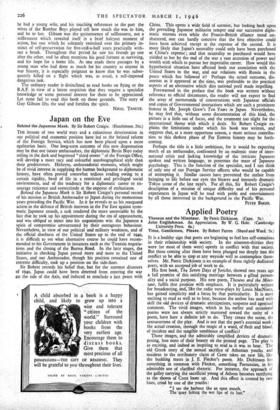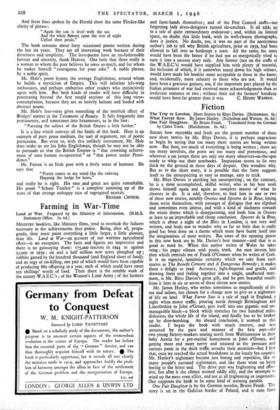Applied Poetry
Theseus and the Minotaur. By Patric Dickinson. (Cape. 5s.)
Time, Gentlemen, Please. By Robert Farren (Sheed and Ward. 5s.)
IT is a healthy sign that poets are beginning to feel less self-conscious in their relationship with society. In the nineteen-thirties they were (or most of them were) openly in conflict with that society. But those coming after them have been plunged too deeply into the conflict to be able to stop at any wayside well to contemplate them- selves. Mr. Patric Dickinson is an example of these rightly dedicated poets, with an accepted job of work to do.
His first book, The Seven Days of 7ericho, showed two years ago a full promise of this satisfying marriage between a gifted person- ality and a social purpose. His new poem, Theseus and the Mino- taur, fulfils that promise with emphasis. It is particularly written for broadcasting, and, like the radio verse-plays by Louis MacNiece, has gained simplicity and a focus by that particularity. It is most exciting to read as well as to hear, because the author has used with skill the old devices of dramatic anticipations, suspense and agonised comment. The vivid images, which in his earlier and occasional poems were not always strictly mastered toward the unity of 3 poem, have here a definite job to do. They create the scene, the sensuousness of the play. And is not that the poet's essential work ; the actual creation, through the magic of a word, of flesh and blood, of incident and the tangible semblance of conflict?
Those images, and the admirably simplified devices of dramatic posing, lose none of their beauty on the printed page. The play is as exciting, and indeed as inspiring to read as it was to hear. The old Greek story of the annual sacrifice of Athenian youths and maidens to the retributory claim of Crete takes on new life, like the budding masts in J. E. Flecker's poem. Mr. Dickinson has something in common with Flecker, something Parnassian, in his admirable use of clarified rhetoric*. For instance, the approach of the galley carrying the sacrificial young of Athens becomes terrifying as the shores of Crete loom up. And this effect is created by two lines, cried by one of the youths: "I see the harbour like an open mouth, The 'quay licking the wet lips of its lust." And these lines spoken by the Herald show the same Flecker-like clarity of phrase: "Again the sun is level with the sea And the white flowers upon the tree of night Unfurl their petals."
The book contains about forty occasional poems written during the last six years. They are all interesting work because of their directness and simplicity. The love-poems have an un-fashionable fervour and sincerity, thank Heaven. One feels that there really is a woman to whom the poet believes he owes so much, and for whom he makes himself "courageous for your sake." A noble phrase, by a noble spirit.
Mr. Hole's poem hymns the average Englishman, around whom he builds a mysticism of Empire. This will infuriate left-wing enthusiasts, and perhaps embarrass other readers who instinctively agree with him. But both kinds of reader will have difficulty in penetrating beyond the first turgid sections of this long verse- contemplation, because they are so heavily latinate and loaded with abstract nouns.
Mr. Hole's free-verse gives something of the metrical effect of Bridges' metres in the Testament of Beauty. It falls frequently into pentameters, and sometimes into hexameters, as in the line:
"Pursuing the subject of the British Empire a little further."
It is a line which conveys all the faults of this book. Here is an example of pure prose medium, the tool of argument, not of poetic persuasion. But even so, with this unlikely instrument, Mr. Hole does make us see his John Englishman, though he may not be able to persuade us that the British Empire is "that crowning achieve- ment of sane human co-operation" or "that power under Provi- dence."
Mr. Farren is an Irish poet with a lively sense of humour. He says that
"Poetry comes to my mind like the redwing
Hopping the hedge for haws,"
and really he is right. His ease and grace are quite remarkable. His poem "School Teacher" is a complete summing up of the woes of that strange unhappy race of segregated mortals.
RICHARD CHURCH.



























 Previous page
Previous page